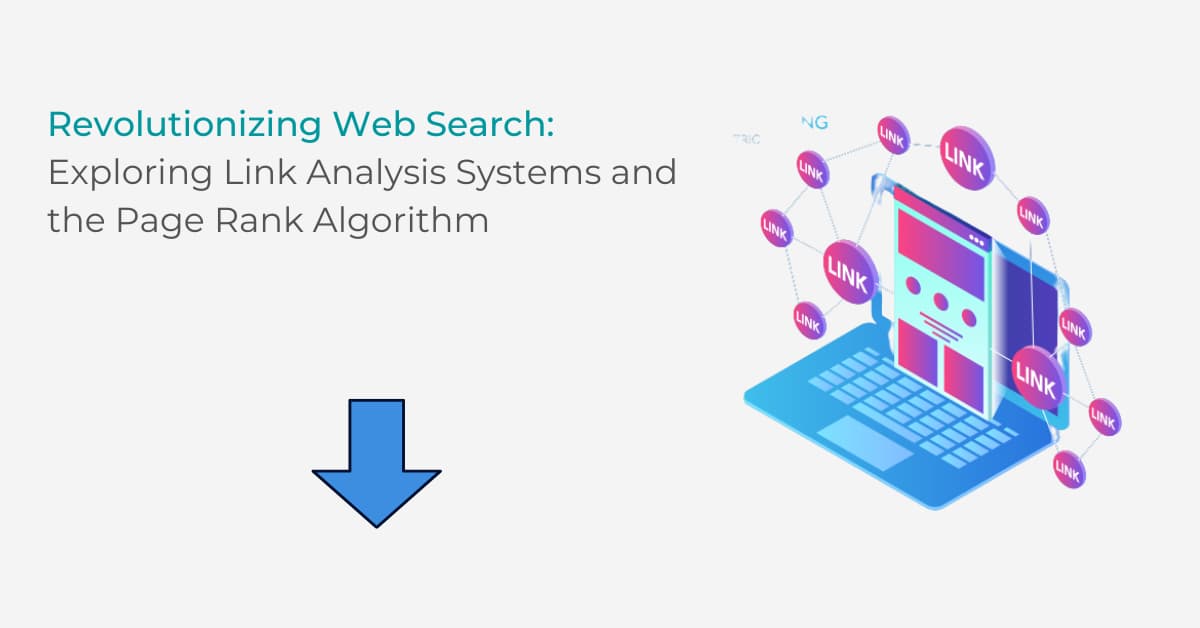Reading Time: 6 mins 22 sec
In this article, we are discussing Link Analysis systems and Page Rank algorithms.

If you want to know in detail about all the Google Ranking Signals, then we have explained 19 Google Ranking Signals shared by Google with details in different articles.
So if you want to make your SEO campaign strong then You read all these Ranking Signals.
Today we will talk about questions related to Link Analysis systems & Page Rank Algorithm and see what it is and how it works.
Link Analysis systems & Page Rank Algorithm both are very interesting topics.
Everyone must have heard about Page Rank, but you might not have heard about Link Analysis System.
But the fact is that Link Analysis System is older than Page Rank.
Link Analysis System is older than search engines.
History Of Link Analysis Systems And Page Rank Algorithm
When the Internet was started, there were no search engines at that time, but there were Directory Websites like Dmoz.
Many old SEOs must have known about Dmoz.
At that time there were not so many websites that people felt the lack of search engines.
But all this was about to change very soon.
The first search engine named Archie was launched in 1987, which is called the world’s first search engine but it was not so! Because Archie did not search from websites.
But used to search from the files that were lying on the FTP Server.
After this, a search engine named Jughead came in September 1993.
But in reality, it was also not a proper search engine because it used to search from a list of Online Documents, so it was also a kind of Directory Website.
Soon after this, in 1993, a search engine named Aliweb was launched.
It was a proper search engine that showed websites in search results with respect to keywords and descriptions.
Apart from this, Aliweb also gave the facility to submit Websites, Keywords, and Descriptions to its Webmasters.
These were all the search engines of earlier times, which I have told you, all of them used TF-IDF for ranking.
The keywords used in Title Tag and H1, and H2 were used.
But they all had the same problem it was very easy to tamper with all these Ranking Signals.
Because people used to stuff keywords in their Articles, Titles, and Headings, Invisible text was used and these search engines used to rank all these bad pages because these search engines have no way to check the importance of the pages.
Wasn’t even a solid method.
Link Analysis System
The problem of understanding the importance of the page of earlier search engines was solved by Link Analysis System.
Even before Google, in 1996, Robin Li Yanhong created an algorithm called Randex, which determined the rank of a page based on how many pages were linking to that page.
This Randex Algorithm was the first such algorithm in the world that started ranking websites by analyzing Linux.
This was given the name of the Link Analysis System.
Page Rank Algorithm
After the Randex Algorithm, Google’s Co-Founder Larry Page created his own Page Rank algorithm, which took this Links Analysis System even further, Page Rank analyzes Linux.
The page Rank Algorithm determines how much the ranking score or Page Rank score from one page will go to another page.
Larry Page claimed that it is not correct to rank websites only on the basis of the number of Linux or the Quantity of Linux because these Linux can also be tampered with like other signals and no matter how many Linux can be made. Could.
The idea of Larry Page’s Page Rank algorithm was that they would measure the Linux received by a page as well as the Linux received by those Linuxes and decide their rank based on the Linux received by any page on the entire Internet.
And then the rank of the pages to which they are giving links can be decided so that when the rank of any one page is finally decided, it should be based on their quality, not just the quantity of Linux.
The inspiration for Page Rank Algorithm was the Randex algorithm but the Page Rank algorithm was better than the Randex algorithm.
This is the reason that Google built on the Page Rank algorithm became the world’s most powerful search engine.
But it is not that Page Rank was the first algorithm that started analyzing Links because before Page Rank Algorithm.
Another algorithm was made which used to analyze Links and this algorithm still exists today.
But Robin Li Yanhong’s Randex algorithm is not over.
This man was from China and he made a search engine named Baidu in China Baidu is still used today.
Now Baidu was formed before Google and the concept of Link Analysis was brought to the world only by the Baidu search engine, but Google implemented this concept in a better way, and that’s why Google is so popular today.
Now there has been a lot of history about Page Rank Algorithms and Link Analysis, let us now look at the existing concepts related to it.
As we have told you that the Page Rank algorithm is completely different from the Link Analysis System.
So Google uses another model to further improve this algorithm, which is called the Random Surfer Model.
Now, what is this Random Surfer Model, and how it works, let us know –
What is Random Surfer Model and how does it work?
Earlier, when Google used to give a ranking score or Page Rank Score to a page through Page Rank Algorithm, then for that Google had to analyze all the Outbound Links and Inbound Links of that page.
And give them a Page Rank Score, only then it could rank that page.
Page rank could decide the score. But in this process, Google had to first decide the rank of many other pages to decide the rank of any one page.
Which is a Time-Consuming process to overcome this problem, Google invented a new model called the Random called surfer model.
Random Surfer Model
The random surfer model randomly visits each page of a bunch of websites of similar Niche and then randomly selects one of the outbound Linux pages of that page and then visits that page.
Randomly visits all the other pages that the page has linked.
This process goes on like this and as many times as Random Surfer Model visits a page, it gives a ranking score to a page.
Therefore, the more pages that are being linked to the page, the more chances of the Random Surfer Model coming again and again on that page, and every time it visits a page, the ranking score of that page increases.
Therefore, if you want to increase your Ranking Score through Random Surfer Model, then you should take links from websites relevant to your Niche.
Which are connected to each other, because Random Surfer Model Bot will come to your page more often, which will increase your ranking score and ranking.
Increasing the score will boost the rank of your page in Google.
But there is a problem in this model too, that is, it keeps roaming inside the same cluster of Random Surfer Model websites.
For example, suppose there are some websites on the same topic that are connected to each other through all the links, that is, a group or bunch of them has been formed.
And apart from this, there is also a group of websites on the same topic that have no connection with that earlier bunch.
There is also no connection i.e. any website present in this group has not given a link to any website present in that earlier group or they have not given any link to them.
Now if Google ranks all the websites present in these two groups on the basis of this Random Surfer Model.
Then it will be wrong because the relevance (relationship) between these two groups cannot be calculated, due to which they do not have any proper ranking score. can be given.
That is why Google adopts a new concept here, which we call the Damping Factor.
Damping Factor
The damping Factor is a Percentage value, which allows the Random Surfer Model to go from one group of websites to another group of websites without any links.
So that Google’s Random Surfer Model is not limited to any one website cluster.
This Damping factor allows Google’s Page Rank Algorithm through its Damping Value it should not to remain limited to any one group.
But go ahead of that group and explore other websites as well.
You can see here that two factors are most important in this Page Rank Algorithm of Google –
- Random Surfer Model
- Damping Factor
Over time, Google has included many other factors other than Page Rank in its Ranking Signals.
But Page Rank Algorithm is the core algorithm on the basis of which Google used to rank websites and still ranks, that is why Quality Backlinks in SEO The importance is still intact.
The more times a page is linked with the more pages, the more often the Random Surfer model visits that page, and the chances of increasing the rank of that page increase.
Now the question comes that how can you use or use this entire process for your website.
How To Optimize a Website For Page Rank Algorithm And Link Analysis System?
If we get the essence of the details mentioned above, then it is that the number of Backlinks received by a page is important and along with it it is also important how many Connected Websites that page is getting Backlinks.
If your page is getting links from Important Pages, then its chances of ranking increase.
But when you take Linux from many websites that are not related to your Niche or you randomly take links from any website.
Then in that case the Chances of the Random Surfer Model visiting your page are very less, due to which The rank of your website will never improve.
Conclusion
In this article, we are discussing Link Analysis systems and Page Rank algorithms.
Friends, this was the 7th Google Ranking Signal in which we learned about the Link Analysis system and Page rank Algorithm in detail.
If you want to optimize your website for this ranking signal, then always take links from such websites which are highly connected and where content similar to your website is posted.

